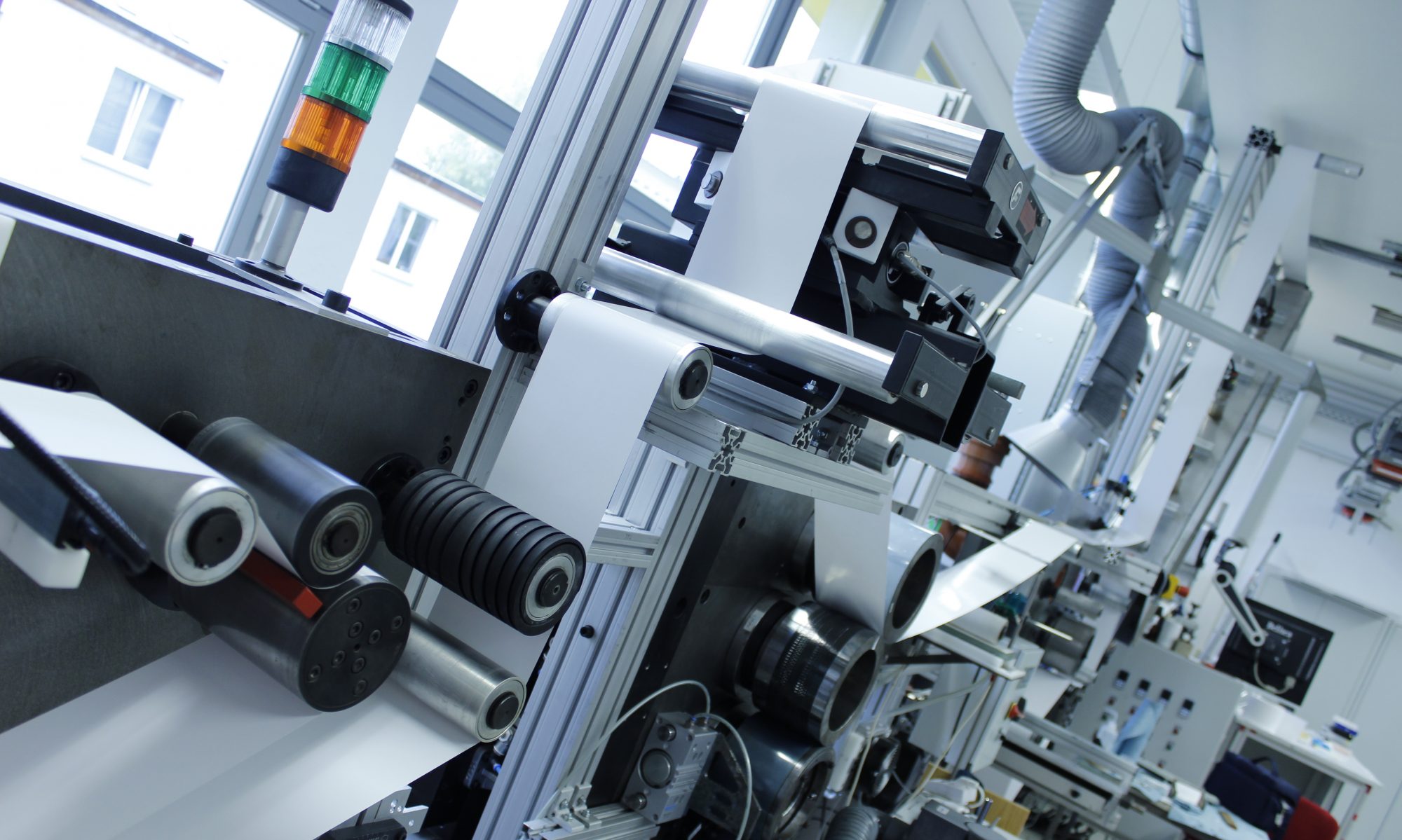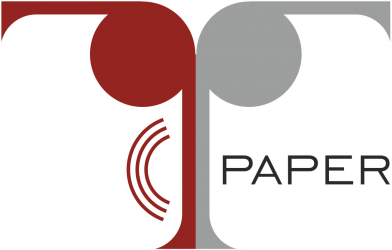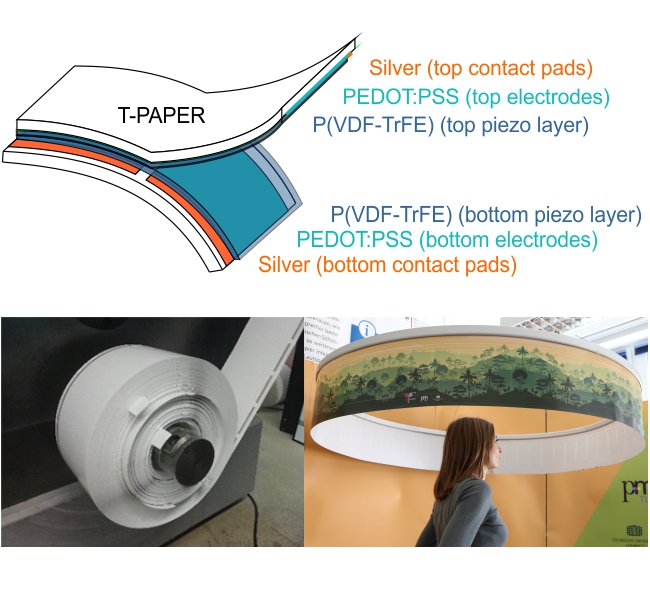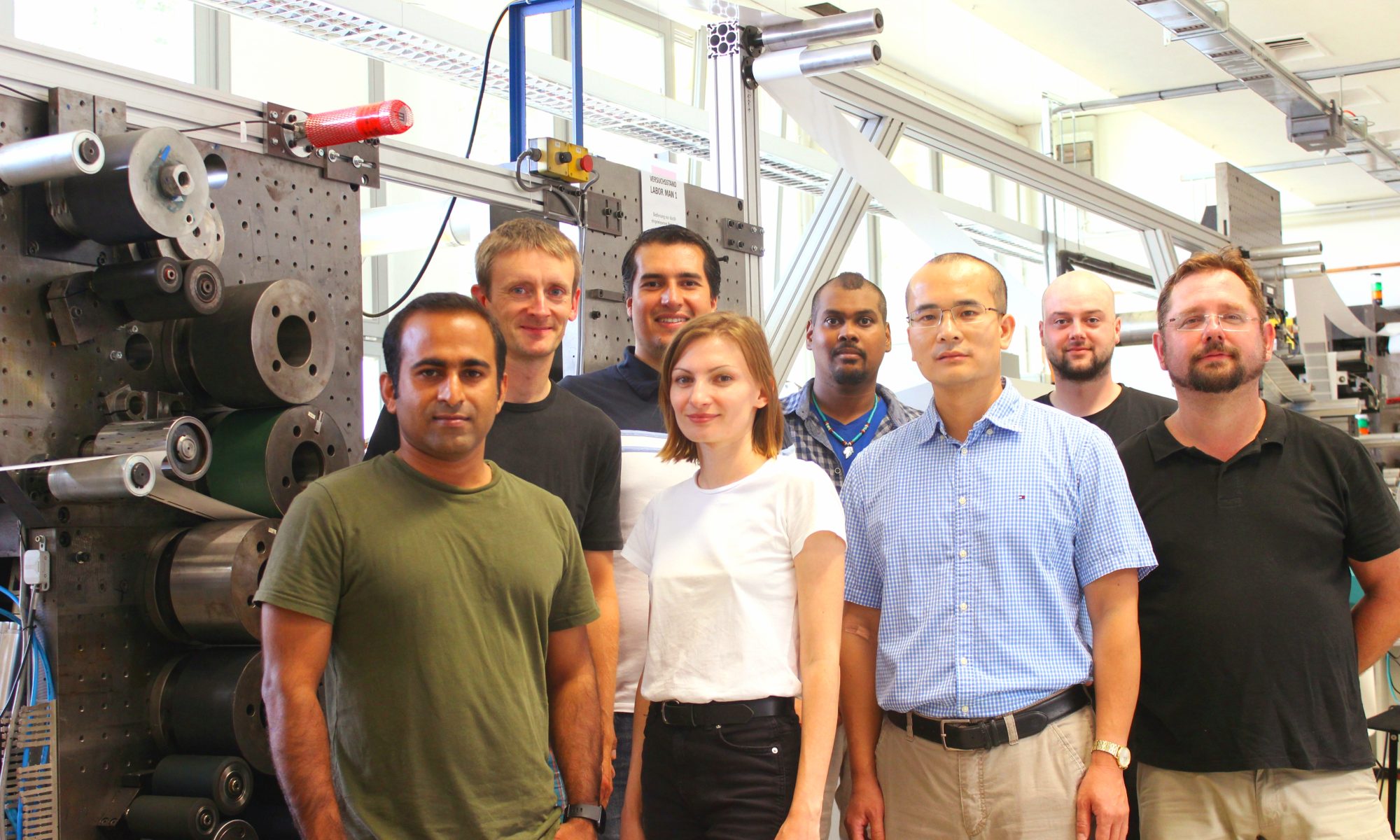In the TUCscicast Dr. Georg Schmidt responds the questions about the latest developments of T-PAPER technology, advantages of the printed electronics today as well as the ideas for the future applications on the basis of printed paper lodspeakers. You will find the TUCscicast in every podcast app!
Our scientific paper in Advanced Materials
T-PAPER team published their new scientific paper on „Paper-Embedded Roll-to-Roll Mass Printed Piezoelectric Transducers“ in Advanced Materials. Georg C. Schmidt and co-authors could realize an innovative concept for large-area piezoelectric devices on paper made by means of cost efficient roll-to-roll mass printing. Also post printing technologies including inline poling were realized at the Institute for Print and Media Technology.
TU Chemnitz presented in the press release a 360° surround-sound installation made with a 387 cm long paper web consisting of 56 piezoelectric speakers. The paper loudspeaker web including printed wiring weighs only about 150 gramm.
Video clip on T-PAPER project is available on the Youtube channel of TU Chemnitz.
VIP+ Report of the Federal Ministry of Education and Research
The Federal Ministry of Education and Research published a report on the last VIP+ Innovation Conference 2019 in Berlin. The T-PAPER team also participated in the Conference 2019. Their printed loudspeaker was presented at the exhibition VIP+UP! .
The aim of the Innovation Conference is a technology transfer from universities to industry. The grant-aided projects have an opportunity to exchange their experiences and to present their latest developments.
The T-PAPER project is funded under VIP+ program by the Ministry of Education and Research since 2017.
T-PAPER presented at the IEEE ISE 2019 in Ireland
The T-PAPER project participated in the 17th International Symposium on Electrets at the University of Limerick.
Dr. Xunlin Qiu talked about “Fully printed polymer layer structures as flexible piezoelectric loudspeaker” and took part in some workshops. He also got a chance to talk about the latest developments of the T-PAPER project with colleagues from Malaysia, Japan, the United Kingdom, China, Denmark and Austria.
Furthermore, the IEEE 17th International Symposium on Electrets was a great opportunity to meet some industrial representatives, such as Bosch Group and Altratech.
T-PAPER put their heads together about remaining months of the project
T-PAPER had a team meeting to discuss successful last months and to brainstorm about new applications of a T-Paper.
Dr. Georg Schmidt gave update and set new proposals for the next months of the project. All this time we were advancing our technology and moving closer to our final goal! We also welcomed a new team member. Varvara Bachul is responsible for marketing and costing. She will also support the T-PAPER project during commercialization.
Our team consists of researchers from all over the world: Sri-Lanka, Colombia, China, India, Russia and Germany. So we are full of energy and looking forward to the next successful months!
T-PAPER at ISE 2019 – 17th International Symposium on Electrets in Ireland
The T-PAPER project goes to the University of Limerick in September.
Dr. Xunlin Qiu will present the latest developments of our technology to the scientific community and manufacturing industry. He will also talk about our T-Box. The IEEE ISE 2019 event includes international guest speakers, workshops and exhibitions. The symposium in Limerick is also an ideal meeting ground for industry to hear from researchers on their latest innovations and practical applications.
Job offers
For the T-paper project we are looking for three scientists interested in supporting our team. You can find the job offers on the website of pmTUC.
Paving the way for a sounding photo book
PRESS RELEASE
The Institute for Print and Media Technology at the Chemnitz University of Technology strives to reach the mass market with the printing of paper-speakers – the project is funded by the Federal Ministry of Education and Research (BMBF) with approx. 1,4 million euros.
If the Institute for Print and Media Technology at the Chemnitz University of Technology succeeds, the speaker of the future will be thin as paper and make photo books and packaging sound. In the laboratories of the Chemnitz researchers this is almost real as they already developed the numerously awarded “T-Book” – a large-scale photo book equipped with printed electronic – in 2015. If a page is turned in the “T-Book”, an invisible speaker inside the paper makes sound. “The T-Book is a milestone in the development of printed electronics”, says Prof. Arved C. Hübler, who is managing and promoting this technology trend for 17 years and increases its global importance.
The sonorous innovation from Chemnitz is hitherto manufactured in a semi-automatic single sheet procedure. In the process, normal paper or foils are printed with two layers of conductive organic polymers as electrodes. In between, a piezoelectric layer is incorporated as active element setting the paper or foil into motion. Thus, by air displacement the sound is produced loud and clear. Both sides of the speaker-paper can be color printed. As until now only a single sheet production is possible, the efficiency of this procedure is yet quite low.
That is why the researchers of the Institute for Print and Media Technology take a new line since May 2017 – towards the cost-efficient mass production. Aim of the current project “roll-to-roll printed loudspeaker paper” (short: T-Paper) is to transfer the hitherto single sheet production to a web-based production. “This is supposed to significantly increase the efficiency of the complete manufacturing process in order to address future mass markets such as photo books”, explains project leader Georg C. Schmidt. Furthermore, the optimization of the performance and visual appearance of the speaker paper is planned. “Thus, the possibility arises to fully exploit the potential of the speaker paper and the extension of the application range towards, for example, the field of sensor technology”, Schmidt continues.
The project “T-Paper” is funded within the framework program “Validierung des technologischen und gesellschaftlichen Innovationspotenzials wissenschaftlicher Forschung – VIP+” of the Federal Ministry of Education and Research in the following three years with approx. 1,4 million euros.






